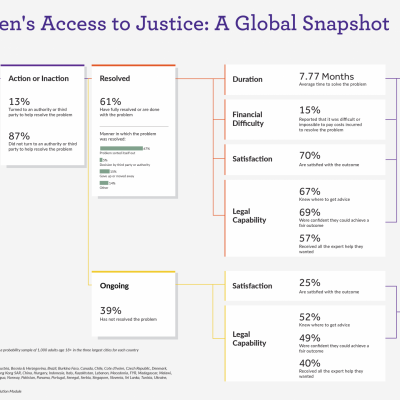
Navigating everyday justice problems is a complex process. This is particularly true for women, who often face unique social and institutional barriers to accessing justice and finding suitable solutions to their legal problems due to gender discrimination, social stigmas, lack of knowledge of their rights, as well as economic and educational disadvantages.1
Capturing problems related to employment, housing, education, health, and family life, among others, civil justice is particularly relevant to understanding women’s interactions with legal systems. In honor of International Women’s Day, the World Justice Project (WJP) produced a snapshot of how women navigate civil justice problems. Included are the most common legal conflicts women experience, their assessments of both formal and informal resolution processes, and the experience of women who did not seek legal assistance or who were unable to resolve their problem. In addition, this snapshot looks at women’s legal confidence and capability, as well as the impact of legal problems on their life.
These data come from a survey module on legal needs and access to justice developed and administered by the WJP as part of our General Population Poll (GPP), conducted in 45 countries and jurisdictions between July and December 2017. For more information on the WJP’s methodology for producing the dispute resolution module, please refer to our Global Insights on Access to Justice report.
When viewed globally, 53% of women report experiencing a legal problem within the last two years. However, only 13% turned to an authority or third party to help resolve the problem. Consumer and housing issues were among the most common problems women experienced. This includes problems related to poor or incomplete professional services, difficulties obtaining a refund for faulty or damaged goods, and disruptions in the supply of utilities, as well as disagreements with landlords, tenants, or neighbors, and becoming homeless. It is important to note that the true incidence of domestic violence — categorized under family problems — is likely underreported in this dataset and is notoriously difficult to measure using traditional household survey methodologies.2
53% of women report experiencing a legal problem within the last two years. However, only 13% turned to an authority or third party to help resolve the problem.
The data show a distinct difference in the legal capabilities between women who were able to resolve their legal problems and those whose legal problems were ongoing. 67% of women who resolved their legal problems knew where to get advice regarding the issue compared with 52% of women whose legal problem remained unresolved.
Of women who reported having a legal problem, 42% experienced a hardship as a result of their problem. More than 1 in 4 women (29%) reported experiencing a physical or stress-related illness as a result of their legal problem, and more than 1 in 5 women (21%) lost their job or needed to relocate. Experiencing such hardships impact women’s ability to fully participate in the economy and in public life.
Looking Ahead
Understanding women’s legal needs and experiences accessing justice provides vital insights for designing policies that address the everyday problems and justice barriers they face. Ensuring equal access to justice fosters both economic development and inclusive growth, and is a crucial component of promoting sustainable development.
The World Justice Project will produce a second installment of the Global Insights on Access to Justice report in 2019, analyzing the legal needs of people in over 100 countries. Sign up here for updates on the new report and more.
1 Turquet, Laura. Progress of the World's Women 2011-2012: In Pursuit of Justice, (New York: UN Women, 2011), 52-55.
2 Accurate statistics on domestic violence are particularly difficult to collect due to women underreporting domestic violence issues.
See Kishor, Sunita. Violence against women: a statistical overview, challenges and gaps in data collection and methodology and approaches for overcoming them, (Geneva: UN Division for the Advancement of Women, 2005).







